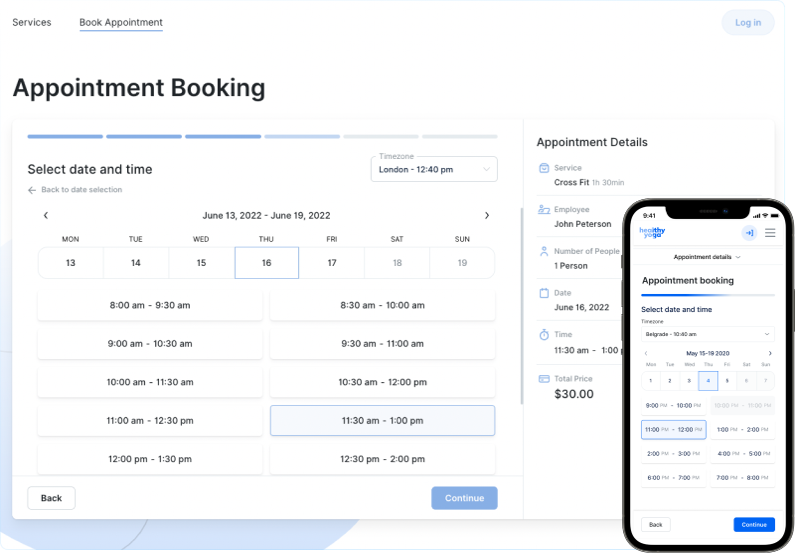The goal of most mentoring programs is to bring experience and young talent together. A fruitful mentoring program results in the interchange of experience and new ideas.
If your organization does not yet have a mentorship program, this would be the time to think about one. This article discusses the various benefits of a mentoring program. It will also give you some tips and tricks to ensure that your mentoring program will be successful.
What Are the Benefits of a Mentoring Program?
A successful mentoring program does not only benefit the mentee. Mentors and the entire organization will find that such programs help them. Indeed, there are many benefits of a mentoring program. A mentoring program can:
- Stimulate inclusion
- Encourage an interchange of new viewpoints
- Create various career development benefits, such as increased chances of promotion
This article will explore some of the many advantages of these mentorship programs. It will explore all parties involved, mentees, mentors, and organizations.
Benefits of Mentoring for Personal and Professional Development
Mentoring programs give mentors and mentees control over their own career development. Without help or stimulus, some may get the feeling that they are stuck in their role or position.
A mentor/mentee relationship can help both parties to grow. A mentee gets involved in a healthy professional relationship with someone that they can consult for advice.
- Confidence. One of the main advantages is that it helps mentees to gain confidence in their abilities and experience. Many have found that mentoring programs help them to express themselves better or stand up for themselves.
- Better self-awareness. Working on career goals helps mentees to do a good self-examination. What are their values, strengths, and weaknesses?
- Learning new ways of thinking. This is true for both mentor and mentee. Both will learn from the other that there are different ways to attack a problem.
- Exchange of feedback. Criticism is not always easy to take, but it is something we should all want. A mentorship program creates a healthy environment for giving and receiving feedback.
- Career advancement. Research has shown that participants in mentoring programs are five times more likely to get a promotion than those who aren’t.
- Job Satisfaction. Satisfaction comes from reaching goals. Reaching goals is the purpose of most mentorship programs.
- Building networks. Another benefit of a collaborative learning environment is that it helps to build a professional network. Some can start to feel stuck with the same people every day, but now they have an opportunity to expand their business relationships.
Improved Onboarding and Productivity
Starting a new job can be overwhelming. A mentor can become a person that newcomers can trust. Whenever they face a problem, they know that they have someone that they can turn to. That gives them confidence and takes away some of the stress of joining a new organization.
After the initial stages, mentors are still of great benefit. After the initial training, it often results in increased job satisfaction. This is important because it leads to better customer service and higher productivity.
Improved Retention Rates
Many companies have found that the retention of good personnel is a huge challenge. Some have observed what has become known as “the Great Resignation.”
A solution is to make a workplace culture that people enjoy. This could be in-office or virtual. Another important factor is stimulating employees’ growth and development.
The old-fashioned approach to growth and development is teaching new skills and evaluating them. But employees grow better and more quickly in a more personal mentoring setting.
Having a personal mentor makes employees feel more valued, which results in being more engaged in their work. It helps them to deal with pressure and to solve problems in a creative way. They become better team players with better communication skills.
Development of New Managers
In most situations, the mentor is the person with the most experience. Often, mentors come from the pool of people in leadership positions. That is good because it helps mentees make faster progress.
Members of a company’s leadership team are at the front line of the work. They are often involved in different aspects, such as recruitment and employee retention.
Managers play key roles in any organization. Yet, some struggle to reach their full potential. Many feel that they lack the support and tools they need to make the impact they want.
Managers can make an impact by mentoring others. Then can help them to increase skills, boost mentees’ confidence, and improve the quality of work. Managers can achieve much more in less time through a mentorship program. This is one of the many benefits of a mentoring program.
Fostering of Diversity and Inclusion
Every person has different backgrounds, life experiences, and views. That can be a challenge, but it is also an opportunity for learning. Learning from different backgrounds in a safe environment is very important. For example, it improves inclusivity. Mentoring programs provide the right environment for learning and interacting.
In this same context, it’s important to note that mentoring helps to spotlight people from diverse backgrounds. Giving employees equal opportunity has become an important element of leadership. Mentors can sponsor their pupils with certain qualities whenever a position opens up.
Reverse Mentoring
In these mentoring programs, both the mentor and the mentee benefit. As communication goes both ways, mentors can learn a lot from their mentees too.
When matching mentors and mentees, it is good to pair mentors and mentees across generations. The older, more experienced generation can teach the younger employees. But the younger generation can teach senior employees about technology and new trends. This further deepens the interactions between higher management and new employees.
Your mentorship success story starts with a scheduling app to streamline your calendar
Staying organized has never been easier.
You can now manage your business and grow your brand with a single, powerful software that keeps all of your appointments in line, your clients organized and your business booming.
Trafft is perfect for business owners who need to streamline their booking experience both for their staff and their clients.

Trafft handles everything for you, even sending automated email or SMS reminders to your clients. No-shows? Not anymore!
The Trafft booking software adapts to different industries for a blissful online booking experience and employee management.
Want to know more? Check out Trafft's awesome features to see what you are missing.
Increased Employee Engagement
One of the other mentoring benefits is increased employee engagement. It develops a company culture where people want to progress in their careers by increasing in skills and knowledge.
Mentoring programs help increase employee engagement in at least three ways:
- Both parties get an opportunity to apply what they discussed during their mentoring sessions.
- Mentoring allows more opportunities for training and exchanging experience and knowledge.
- Mentorship breaks down communication It gives employees the chance to show their leadership skills.
Employee engagement links with working relationships. Mentoring programs reinforce social connections between colleagues. This prevents them from burning out and getting discouraged, Instead creating a positive mindset.
One of the other benefits of mentoring is that it increases accountability and commitment. That, in turn, will minimize procrastination.
Stimulation of Knowledge Sharing
Mentoring initiatives make knowledge sharing easier. This happens no matter what kind of approach you use. It works with both traditional and bottom-up approaches.
Why is this so important? In the first place, because it stimulates collaboration within a team and across departments. That leads to increased productivity and innovation. This happens when people from different backgrounds get together and come up with new solutions to existing problems.
Reduced Costs
Training new employees is an expensive activity. Also, finding adequate talent to fill vacancies is something that costs a lot of time and money. In fact, searching for new talent and training new recruits is much more expensive than retaining current staff. A higher retention percentage is one of the benefits of mentoring. Having a reliable person that mentees can turn to reduces anxiety, stress, and sick days taken.
An internal training program in the form of mentoring programs obviates the need for external expertise. The positive results that come from mentoring initiatives are clearly seen throughout an organization.
How to Ensure the Success of a Mentor Program
The benefits of a mentoring program are evident. That does not mean that any mentorship program will work everywhere. The shape and form that mentorship programs take differ from company to company.
There are some specific things to keep in mind when starting mentorship programs. Here, you can read what they are.
Use an Informed Approach for Matching Mentors and Mentees
The way you pair mentors with mentees is crucial. Wrong mentor/mentee combinations will result in very disappointing results.
Before starting the program, you can hand out questionnaires that will teach you more about the people that you want to match. You can include questions about career development goals, communication styles, and skill sets.
Establish Mentorship Guidelines
It is important that both the mentee and the mentor know what you expect of them. Check in from time to time to see how the progress is going. Be consistent in your expectations.
Integrate Mentorship Into Your Culture
This learning culture should be an integral part of your organization. New hires should immediately be aware of this, so promote it early on. After you get to know a younger employee, you will be able to match them to a suitable mentor.
FAQs about the benefits of a mentoring program
1. What are the key benefits of having a mentoring program in an organization?
Organizations can gain a lot from mentoring programs, including increased employee engagement, retention, and productivity. They support a healthy corporate culture, knowledge sharing within the company, and employee skill and capability development.
Moreover, mentoring can enhance leadership abilities, support diversity and inclusion in the workplace, and identify high-potential personnel.
2. How can a mentoring program improve employee retention and reduce turnover?
By promoting a sense of community and participation, mentoring programs can increase employee retention and decrease turnover. Mentors can offer advice and assistance to mentees while also assisting them in navigating organizational problems.
Increased job satisfaction and motivation as a result of this support may result in improved retention rates. Mentoring programs can also assist in identifying and resolving problems that might lead to employees leaving the company.
3. What is the impact of mentoring on employee engagement and job satisfaction?
Engagement and job satisfaction among employees are positively impacted by mentoring. Mentors who provide assistance and direction to their mentees are more likely to make them feel motivated, valued, and supported.
This may result in better performance, more job satisfaction, and enhanced involvement with their work. Employees can express their ideas and thoughts through mentoring, which can make them feel more a part of the company.
4. How can a mentoring program help develop employees' skills and capabilities?
By offering them individualized direction and assistance, mentoring programs can aid in the development of employees' skills and talents.
In order to help their mentees learn new skills and advance their current ones, mentors can impart their knowledge, experience, and expertise to them. Employee productivity and efficiency can increase as a result, improving work output and career advancement.
5. What is the role of mentoring in promoting diversity and inclusion in the workplace?
Mentoring is essential for fostering inclusion and diversity in the workplace. Employees from underrepresented groups can benefit from mentorship, which can assist them navigate the culture of the company and remove obstacles.
Mentoring also promotes collaboration between people from various backgrounds and breaks down silos, making the workplace more inclusive.
6. How can a mentoring program help foster a positive organizational culture?
By encouraging information sharing, collaboration, and teamwork, mentoring programs can aid in the development of a positive workplace culture.
Mentors can act as role models, exemplifying the company's ideals and fostering a culture of growth and learning. A beneficial loop that benefits the workers and the company might result from this, increasing employee engagement, job satisfaction, and retention.
7. What are some of the challenges of implementing a successful mentoring program?
A mentorship program's implementation can be difficult. Finding and choosing qualified mentors, pairing mentors and mentees, maintaining good communication between mentors and mentees, and determining the program's efficacy are some frequent problems. However, mentoring programs demand a sizable time and resource commitment, which might be difficult for some firms.
8. How can a mentoring program help bridge the gap between employees' current and desired skill sets?
By offering employees individualized coaching and support, mentoring programs can assist in bridging the gap between their present skill sets and desired skill sets.
Mentors can help mentees by pointing out areas for improvement and giving them the tools and advice they need to advance their careers. This can boost job performance and career progression by assisting people in developing the skills they need to advance in their jobs.
9. What is the ideal structure and duration of a mentoring program?
The objectives and requirements of the organization will determine the best format and length of a mentorship program.
While some organizations might choose an informal program that allows mentors and mentees to get in touch as needed, others might prefer a formal program that lasts for a predetermined amount of time.
The time and resources that the organization has available should be taken into account when designing the format and length of a mentorship program.
A successful mentoring program should include clear objectives, rules for interactions between mentors and mentees, and a procedure for assessing the program's effectiveness, regardless of its format or length.
10. How can a mentoring program benefit both the mentor and the mentee?
The mentor and mentee both gain from mentoring programs. Mentors provide advice, encouragement, and feedback to mentees, which can aid in their goal-setting and skill development. Mentors, on the other hand, have the chance to return the favor to the company by imparting their wisdom.
Also, mentoring gives mentors the chance to hone their leadership abilities and broaden their networks inside the company.
An effective mentoring program ultimately helps the whole company by encouraging employee development, progress, and teamwork.
Final Words on the Benefits of a Mentoring Program
As an employer, you know the need for engaged and productive workplaces. Successful companies don’t come about by organizing weekend trips or football leagues. More concerted efforts are necessary.
The benefits of a mentoring program are numerous. Establishing a program in your company is one of the ways to achieve better employee performance. It increases knowledge transfer and it gives employees the feeling the company values them.
If you enjoyed reading this article about the benefits of a mentoring program, you should read these as well:
- Interesting Mentoring Activities to Try with Your Mentees
- The Various Types of Mentorship You Should Know
- Mentoring Skills You Should Have to Be Successful






